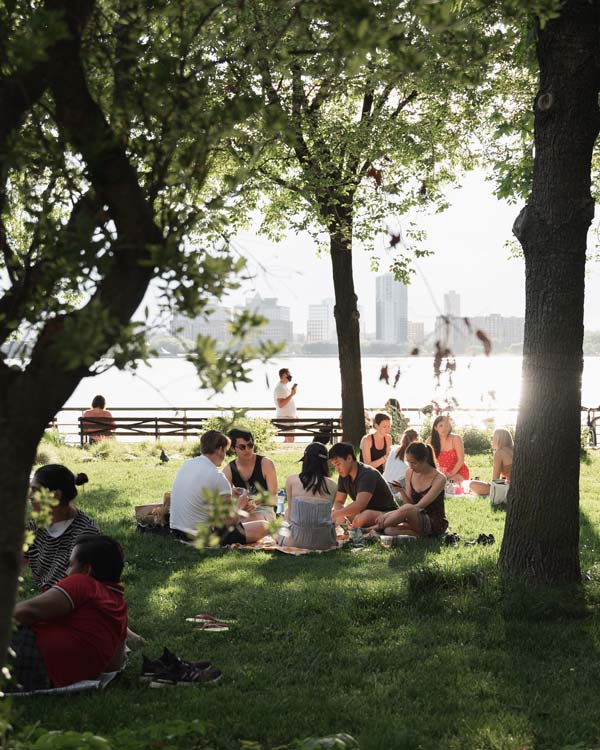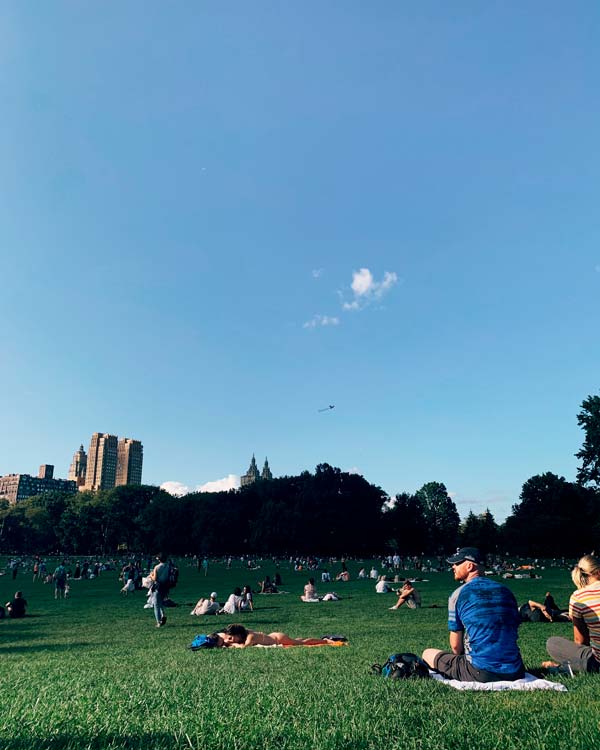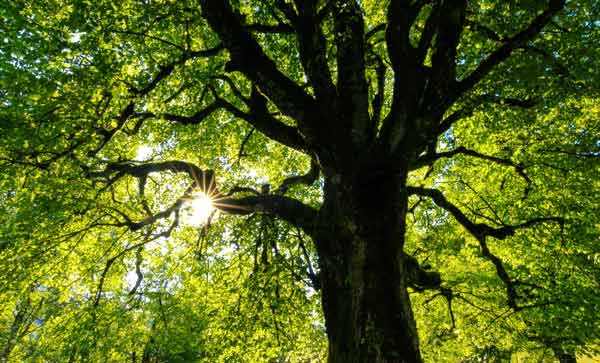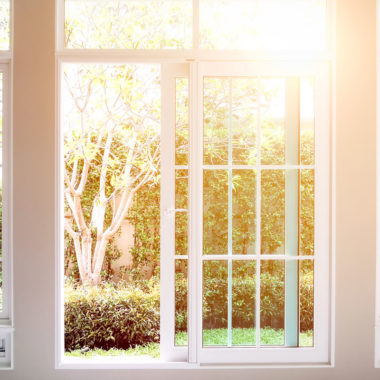Do we not talk about “recharging our batteries in the countryside?”. Without really pinning down what the perceived benefits are, nature does us good. It has now been proven by a great many studies: communing with nature has a great many health benefits, both physically and mentally. Here, we explain why and how to make the most of the nature’s powers.
At close quarters with nature
When we talk about nature and “communing” with it, it’s about various interactions. Because unlike the city, nature represents all that is green, wild and fallow. We’re talking about an environment with natural elements like the sea, a river, a tree or a mountain. An environment where you can feel them, like hearing or feeling the wind, rain or thunder. This communion is an interaction that involves the five senses, either together or separately. The blue of the sky, the sound of the ocean, the feel of the soil and the smell of cut grass are all signals that bring with them a sense of happiness and calmness. Simply having plants near you brings you serenity and better oxygenation. In English there is even talk of the “green vitamin”, referring to nature’s stimulant effects on the human species, with administration possible as short-term courses of treatment or a simple daily dose!
Nature in what dosage?


You can get this “dose” from a walk in the woods, or a coffee break in a park rather than the cafeteria. As with medication, you can adjust the frequency and length of administration to increase its benefits. This need to spend time communing with nature, to “experience” it with our senses, is a basic need of our species. A need that has been ignored for too long, and cannot be met with sedentary urban lifestyles. Regularly losing this communion with nature translates into a deficiency that can impact on our health. It is what scientists call “the extinction of experience”. According to a study conducted by the universities of Exeter (UK) and Uppsala (Sweden), spending just two hours per week in a natural environment is enough to see improved wellbeing and positive effects on health. Something worth bearing in mind: gardening is a particularly stress-busting activity, since it combines exposure and direct communion with nature with a gratifying, rewarding undertaking.
Is the city the cause of our ailments?
The human species is probably not designed to live without nature. Moreover, we have the relic of a reptilian brain, which still expects to be surrounded by light, green, blue and noises, and is hard pressed to exist in a grey world filled with manmade noises. In fact, thermo-industrial civilisation, which has all but erased all trace of nature in cities, has not been around for very long. It forces the human species to adapt to what its brain perceives as attacks – to exhausting, permanent urban overstimulation. This causes the five senses to be saturated with images and smells, pollution, car horns, hustle and bustle… Sight, smell and hearing are subject to enormous stress, which keeps the human body permanently on alert. When subject to so much anxiety, loss of concentration, overheating and mental exhaustion, some develop depression and mental health problems. That’s why it is no surprise to feel so “relieved” when it all stops as soon as we escape into nature! The good news: this antidote works almost instantly!
Getting reconnected right in the heart of this precious nature is not a whim, or a snobbish indulgence of the modern city-dweller. It’s a deep-seated need, and a remedy for a great many ailments. Specialists have coined a word for this instinctive and primitive need: “biophilia”.
Taking a walk in the countryside: an antidepressant

There have been a great many studies on the benefits of a country walk. One of them shows that a regular, five-minute exercise session or walk in a park, natural or green environment has mental health benefits! Taking a walk in a green space is literally a way of hitting the brain’s pause button. A researcher has observed that following a country walk, the prefrontal cortex is less active, whereas it is very active in a depressed person. A country walk regulates the emotions, puts us in a better mood and calms us down by reducing rumination and anxiogenic thoughts. It relaxes the mind, and also the body. Blood pressure remains stable during a walk through the woods, whereas it rises if we take a “walk” in town near a main road. As do the heart rate and level of cortisol (that stress hormone whose release is stimulated by the urban environment). The benefits of sport are greater when it is practised outdoors. Neuroscience has even confirmed that proximity to nature prevents the development and worsening of neurological and psychiatric conditions.
Improved attention span and powers of concentration
Thus, spending time “outdoors”, in a green space, improves cognitive function and mitigates psychiatric disorders. More incredible still: looking at a natural space has positive effects on attention span and powers of concentration! An Australian study has demonstrated this by asking two groups of students to complete an exercise after having looked at either a concrete space or a green space planted with flowers in town, for… just 40 seconds! The subjects who looked at the flowers performed significantly better, which demonstrates the positive sensitivity of the brain when exposed to nature. When the brain is “cleared”, the part of it in charge of cognition and task organisation is stimulated, and it can reach higher levels of creativity. These results make it possible to help children with ADHD (Attention Deficit Hyperactivity Disorder) the “natural” way. This well-known disorder is particularly debilitating at school, where demands are placed on pupils in terms of concentration and sitting still. It can be mitigated by sporting activity, or just by walks in a green space. This also makes it possible to cut down on the drug treatments often administered to treat this disorder.
Gazing out at the sea – soothing nature
It is not just “green” that hits the “wellbeing” button on our metabolism. Proximity to the sea is also a very effective way of lifting the spirits. Here too, the five senses are important: your feet in the sand, the sound of the waves and surf, the feel of the sea breeze on your face or seawater on your skin. The sea is clearly an excellent remedy for (almost) anything! But more than that, gazing at it has a deeply soothing effect. Everything perceived by the human body and brain at the seaside is said to have a stronger effect than that of green spaces! So gazing out at the blue expanse of the ocean is said to be the ultimate nature experience. It’s a super-high dose of positive effects on psychological disorders, stress, anguish, depression and sleep deprivation. Which are disorders that occur less frequently in those who live in coastal areas. The same phenomenon occurs when we gaze out onto a secluded mountain lake, which is more conducive to meditation and serenity than a lake in which there is human activity going on. In fact, the more unspoilt and wild the locality is, the more beneficial its effects are.
Look at nature to reduce violence

It’s easy to see why nature is a tremendous tool for reducing violence in very overpopulated built-up areas. Because while nature reduces stress and irritability and naturally promotes sleep, it also makes it possible to reduce aggressive behaviour.
An American study conducted in a high-security prison put on screenings of nature images for some of the inmates, several times a week. Over the several hours following the video screenings, the researchers noted a drop in attacks, violent behaviour and signs of agitation in the inmates. This observation was confirmed by the prison staff, who noted that a year into the experiment, the inmates who attended the nature image screenings had fewer behavioural problems. So if you are in a foul mood and have no direct access to nature, watch a few videos of wildflower fields, forests or mountain waterfalls to calm you down!
Diversity and sunshine – precious and protective
Beyond the positive effects on mental state, living in or close to nature exposes the human body to a wide variety of substances that stimulate its natural immunity. Whereas in a sanitised environment where human beings are exposed to few or no microbes, the human body develops allergies or inflammatory reactions more easily. The human body is strengthened through communion with nature, as long as it’s an environment with high biodiversity and not too many pesticides! Moreover, due to a lack of exposure to certain microbes, loss of biodiversity is said to cause a microbiota condition which can lead to diseases, since the body doesn’t know how ward them off.
Lastly, exposure to natural sunlight is the only thing that allows the body to make vitamin D, thanks to UVB rays. Method: catch the rays for 15 to 30 minutes, twice a week. That’s where vitamin D plays a preventative role against osteoporosis, bone decalcification and also cardiovascular disorders and some types of cancer. Lastly, a sunset or sunrise indisputably brings inner peace with it – just see for yourself!
In the office, pollution-busting plants are the way forward!

If you can’t get away to a park for your lunch break, you can always surround yourself with plants. Their presence can’t take the place of a walk in the woods, but it can have a soothing effect on you. Studies have even shown that the presence of plants in the workplace reduces the frequency and length of sick leave! There are even “pollution-busting” plants to address conditions caused by indoor pollution: asthma attacks, allergies and headaches. Because indoor air can be up to 10 times more polluted than outdoor air. This is due to pollution and also fumes from paint, coverings and microparticles in manmade materials, and those Volatile Organic Compounds (VOC) that we nonetheless breathe in all the time. Houseplants stand for good health. In addition, don’t forget that natural materials, like wooden and mineral-based ones, also have a protective and reassuring feel to them.
“Go to the countryside” to get well again: therapy gardens
After an accident or illness, convalescence happens more quickly in a natural environment. Even simply looking out of the window at a natural environment has a positive effect. Research work has proven that hospital patients recover more quickly if they have a room “with a view” of the outside, overlooking a park for example. Several studies and advances in neuroscience have confirmed this correlation, hence the creation of therapy gardens. The beneficial effect of nature also reduces the sensation of pain, painkiller administration can be reduced and the healing process is accelerated. The benefits of these gardens are such that they are being incorporated into retirement homes, due to their effectiveness in addressing degenerative neurological conditions like Parkinson’s and Alzheimer’s disease. The “art, memory and life” therapy garden at the Nancy region university hospital is described as “a therapeutic space for those with Alzheimer’s disease”. Its ability to tackle the disease directly is borne out by improvements in patients’ degree of autonomy, cognitive abilities, sleep, reduced aggressiveness and agitation.
Sylvotherapy: vibrate in time with the trees

In terms of recharging one’s batteries in a natural environment, touching trees or “tree-hugging” is well known. Proximity to trees lowers the heart rate and levels of stress hormones (cortisol and adrenaline). Basically, trees calm us down! Taking a mindful walk, in physical contact with trees, brings all of the possible benefits with it: reduced anxiety, improved concentration, clear thinking, less anger, improved mood, a reduction in signs of depression, etc. According to some research work: “spending time” in woodland is said to have an effect on those of our cells that are in charge of fighting cancer cells, and so bolster our immunity to cancer. Basically, for the sake of our health, we should all have a tree at home!
Don’t wait another minute to get yourself some exposure to nature, or transpose it into your life! But you still need to be aware of the therapeutic power of such a remedy to address our modern ailments, all on a free and unlimited basis! It’s up to us to listen to what our instinct is whispering to us, what our body and mind feel when communing with nature. And it does us good! So let’s cultivate it, protect it, and don’t forget: when things are not going your way, a dose of green or blue will make you feel better!







